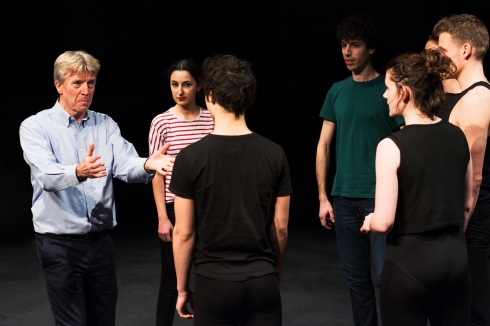You are currently browsing the tag archive for the ‘emotion’ tag.
10 Adopt the right mindset
In The Outstanding Actor: Seven Keys to Success, I’ve talked a lot about the importance of having the right mindset. Your mindset is your default habit of thinking. For instance, it’s very easy to regard a forthcoming audition or interview with dread: “I’m not really up to this. I’m punching above my weight. They’ll see through me. I’ll probably mess up the lines. I’m not the type they’re looking for. Everyone else will be better than me.” That sort of thing.
If you give these thoughts free rein they quickly set up a poisonous cycle of negative expectation. So when you finally walk into the room, all that self-doubt will be written on your face and your body. It’ll also be in the tone of your voice and the words you use to describe yourself and why you want to be an actor. And above all it will affect your thinking: it’s amazing how inarticulate you can become when you adopt a negative mindset.
The director or auditioning panel will in turn be affected by this because neuro science tells us that when we see recognisable behaviour (for instance someone being anxious) part of our brain takes on the same mode and we start to feel uncomfortable just watching you.
Preparing yourself in a positive mindset – “This is a great chance to show what I can do. I’m making some valuable contacts here. I love talking about my passion for acting. Let’s enjoy exploring this piece together and see what happens.” – is going to change the way you walk into the room and the quality of your presence. Your positive enthusiasm will be written on your face and body. Your mind will function more lucidly. In turn, that is likely to make the person auditioning you more relaxed and motivated to get the best out of you. All this will increase your chances of getting the result you want.
And how to you get into that positive mindset? One way, as I mentioned in tip number 6, is to prepare yourself in the weeks and days leading up to the audition by visualising, through all your senses, the way you want the audition to go. It’s as if you’re creating in your mind a mini-movie of the event. Keep replaying it to yourself and you’ll start to feel more positive about the audition.
Twitter – https://twitter.com/Kenneth_Rea
9 Dealing with nerves
One of the hardest aspects of auditions – both in professional and drama school auditions – is dealing with your nerves. You really want that part, or to get into that drama school, and in a sense it feels as if your life depends on it. It’s accepted that you’ll be nervous. In fact if you’re not nervous, you should worry because you might be coming across as too laid back, as if you don’t really care. That can be very off putting.
It’s often struck me that many of my most successful Guildhall students got their first break when they were still in the last month or two of their training. They were rehearsing for a third year production, so they could bowl up to the audition in a relatively carefree way, enjoy the experience and then go back to their rehearsal. When you’ve been out of work for three months, it’s much harder to project the same carefree enthusiasm.
The best advice I can give is: make it about them, not you. If you’re heavily focused on how you are coming across, you’ll project mainly your anxiety. And that makes the panel feel uncomfortable. On the other hand, if you focus on giving the panel an enjoyable time, you start to take the pressure off yourself. How do you do this?
One way is to play the following trick on your mind. Give yourself the freedom to throw the audition away, rather than worrying whether or not the panel is seeing your very best work. You still aim to do the piece well, but without desperation. The effect of this is that you relax enough to find more openness and your nerves are reduced. The energy becomes more extrovert rather than introvert.
At the same time, go in with a spirit of openness, as if to say to yourself: “Together we’re going to explore this piece and see what makes it tick.” Your curiosity will relax and energise the panel, and creative work starts to happen. Your attitude becomes: “I’m enjoying being here to try out this speech. I may not be exactly the person you’re looking for, but let’s take a few minutes to explore this together and just see if we like working with each other. I’ll try to make it as easy for you as I can.”
And finally, remember that it’s also you auditioning us. The casting director or the drama school may appear to have all the power, but you’ve got to want them as well. Just realising that you can choose whether you’d like to work in this company or that drama school, without being arrogant of course – that thought alone frees you up a lot and enables you to come across with more openness and confidence.
Amazon – http://amzn.to/2lgQTKI

We’re all born with fairly open faces, but by the time we’re 30 or 40, that face may have turned into a character mask that reflects our default mood.
